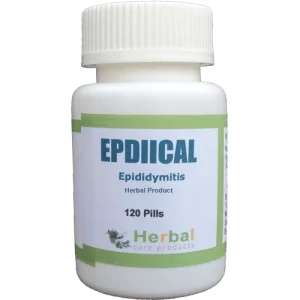What is Epididymitis?
Fast facts
- Epididymitis is an inflammation of the epididymis, a tube near the testicles that stores and carries sperm.
- Epididymitis in adults is most often caused by gonorrhea or chlamydia, while epididymitis in children is likely caused by direct trauma or a urinary tract infection (UTI).
- Complications are rare, but can include infertility and death of testicular tissue.
Epididymitis is an inflammation of the epididymis. The epididymis is a tube located at the back of the testicles that stores and carries sperm. When this tube becomes swollen, it can cause pain and swelling in the testicles.
Epididymitis can affect men of all ages, but it’s most common in men between ages 14 and 35. It’s usually caused by a bacterial infection or a sexually transmitted infection (STI). The condition usually improves with antibiotics.
Acute epididymitis lasts six weeks or less. In most cases of acute epididymitis, the testes are also inflamed. This condition is called epididymo-orchitis. It can be difficult to tell whether the testes, epididymis, or both are inflamed. That’s why the term epididymo-orchitis is commonly used. According to the Centers for Disease Control and Prevention (CDC), gonorrhea and chlamydia are the most common causes in men 35 years old or younger.
Chronic epididymitis, on the other hand, lasts six weeks or more. Symptoms include discomfort or pain in the scrotum, epididymis, or the testicles. This may be caused by granulomatous reactions, which can result in cysts or calcifications.
What are the Symptoms of Epididymitis?
Symptoms for epididymitis may begin with only a few mild symptoms. When it’s left untreated, however, the symptoms of epididymitis tend to get worse.
People with epididymitis symptoms may experience:
- low-grade fever
- chills
- pain in the pelvic area
- pressure in the testicles
- pain and tenderness in the testicles
- redness and warmth in the scrotum
- enlarged lymph nodes in the groin
- pain during sexual intercourse and ejaculation
- pain during urination or bowel movements
- urgent and frequent urination
- abnormal penile discharge
- blood in the semen
What Causes of Epididymitis?
The most common causes of epididymitis is an STI, specifically gonorrhea and chlamydia. However, epididymitis can also be caused by a nonsexually transmitted infection, such as a urinary tract infection (UTI) or prostate infection.
You may be at a higher risk for epididymitis if you:
- are uncircumcised
- have unprotected sex
- have structural problems within the urinary tract
- have tuberculosis
- have an enlarged prostate causing blockage in the bladder
- recently had urinary tract surgery
- recently experienced a groin injury
- use a urinary catheter
- use a heart medication called amiodarone
STIs are a common causes for epididymitis. Gonorrhea and chlamydia are the most common. These infections will cause an infection in the urethra. These infections will sometimes travel down the vas deferens to the epididymis or testes to cause an infection there.
Nonsexually transmitted infections, such as those that come from UTIs or tuberculosis, can travel from the urethra or other parts of the body to infect or cause inflammation of the epididymis.
Pediatric Epididymitis
Children can get epididymitis just as adults can, though inflammation is more likely to have a different cause.
Common epididymitis causes in children include:
- direct trauma
- UTIs that spread to the urethra and epididymis
- reflux of urine into the epididymis
- torsion or twisting of the epididymis
Symptoms of epididymitis in children include:
- discharge from the urethra
- discomfort in the pelvis or lower abdomen
- pain or burning during urination
- redness or tenderness of the scrotum
- fever
The treatment of epididymitis will depend on the underlying cause of the condition. In many causes, the condition may resolve on its own, aided by rest and pain relievers like ibuprofen. In a bacterial infection, like one that would come from a UTI, antibiotics may be prescribed. Children will also be advised to avoid “holding it in” when they need to use the bathroom, and to drink more water.
How is Epididymitis Diagnosed?
Your doctor will first complete a physical examination. They’ll look for swelling of the testicles, swelling of the lymph nodes in the groin area, and abnormal discharge from the penis. If there’s discharge, your doctor will use a cotton swab to collect a sample and test for STIs.
Your doctor may also perform the following tests and procedures:
- rectal examination, which can show if an enlarged prostate caused your condition
- blood tests, such as a CBC (complete blood count), to determine whether there’s an infection in your system
- urine sample, which can indicate if you have a urinary tract infection or an STI
Imaging tests may be done to rule out other conditions. These tests produce detailed images that allow your doctor to see structures in the body very clearly. Your doctor might order a testicular ultrasound to get images of the testicles and the surrounding tissues in the scrotum.
What are the Treatment of Epididymitis?
Treatment for Epididymitis involves treating the underlying infection and easing symptoms.
Common epididymitis treatment include:
- antibiotics, which are administered for 4 to 6 weeks in chronic epididymitis, and can include doxycycline and ciprofloxacin
- pain medication, which can be available over-the-counter (ibuprofen) or can require a prescription (codeine or morphine)
- anti-inflammatory medication like piroxicam (Feldene) or ketorolac (Toradol)
- bed rest
Additional treatments may include:
- elevating the scrotum, for at least two days if possible
- applying cold packs to the scrotum
- wearing an athletic cup for support
- avoiding lifting heavy objects
In cases of an STI, you and your partner should abstain from sexual intercourse until you’ve completed your course of antibiotics and are fully cured.
These methods are usually successful. It can sometimes take several weeks for the soreness or discomfort to go away completely. Most epididymitis cases clear up within 3 months. However, more invasive treatment may be needed in some cases.
If an abscess has formed on the testicles, your doctor can drain the pus using a needle or with surgery.
Surgery is another option if no other treatments have been successful. This involves removing all or part of the epididymis. Surgery may also be necessary to correct any physical defects that may be causing epididymitis.
Natural Herbal Treatment for Epididymitis
This is the way to treat swelling testicles infection with Epdiical natural herbal remedies safely. Treatment by epididymitis natural remedies we prefer the Herbal Care Products company, who are create natural remedies for patients. epididymitis herbal remedies is the epdiical product. Best epididymitis natural treatment help to improve scrotum disease & Epididymitis Herbal Treatment have no side effects.
What is the outlook for someone with Epididymitis?
Most cases of acute epididymitis are successfully treated using antibiotics. There are usually no long-term sexual or reproductive problems. But the infection can return in the future. It’s also possible for complications to occur, but this is rare.
Potential complications include:
- chronic epididymitis
- shrinkage of the testicles
- fistula, or an abnormal passageway, in the scrotum
- death of testicular tissue
- infertility
It’s important to seek treatment right away to prevent complications. Once you receive treatment, it’s important that you take your entire course of antibiotics to treat the infection, even if you feel symptom-free. You should also see your doctor after you’ve finished the medication to make sure that the infection has cleared. This will help ensure that you make a complete recovery.
If you’re experiencing persistent pain or discomfort, make an appointment to see your doctor, especially if the symptoms don’t improve within four days. If you’re experiencing severe pain in the scrotum or have a high fever, seek medical attention immediately.
Source Link : http://www.healthline.com/health/epididymitis#Overview1





